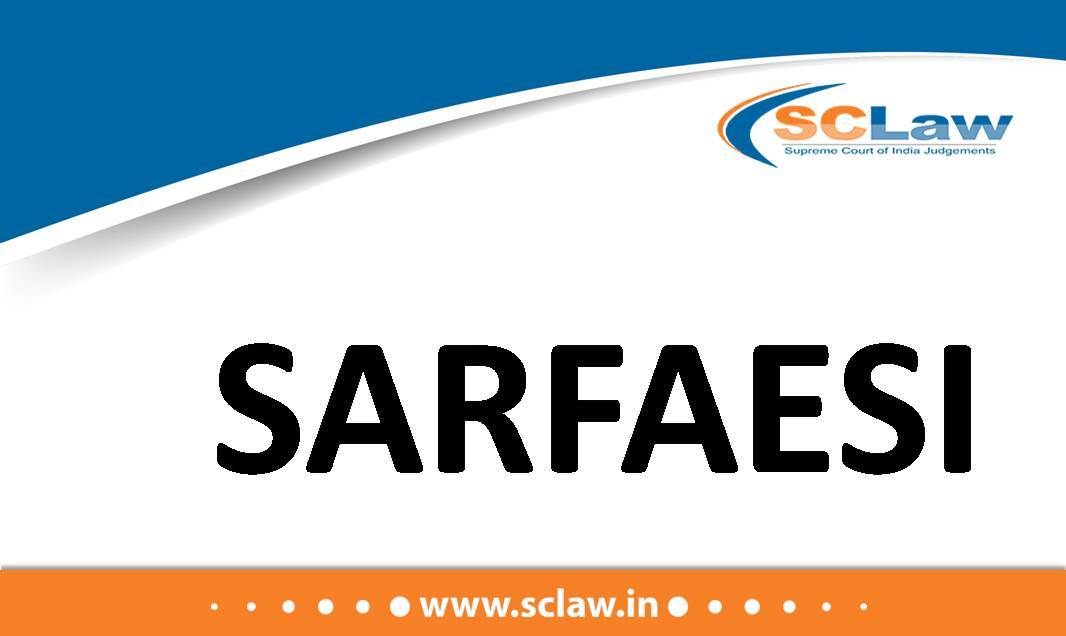Prevention of Money – Laundering Act, 2002 – Sections 5, 8(4), 15, 17 and 19 – Constitutional validity of Sections 5, 8(4), 15, 17 and 19 of the Prevention of Money – Laundering Act, 2002 is upheld – Directorate of Enforcement (ED) has powers to arrest, attachment, search and seizure – At the stage of issue of summons, the person cannot claim protection under Article 20(3) of the Constitution.
SUPREME COURT OF INDIA FULL BENCH VIJAY MADANLAL CHOUDHARY AND OTHERS — Appellant Vs. UNION OF INDIA AND OTHERS — Respondent ( Before : A.M. Khanwilkar, Dinesh Maheshwari and C.T.…
Calcutta Thika Tenancy Act, 1949 HELD a. that the structure in question was a pucca structure; and b. that the Act of 1981 was not operative in relation to the property in question because of the stay order passed by the High Court.
SUPREME COURT OF INDIA DIVISON BENCH NEMAI CHANDRA KUMAR (D) THR. LRS. AND OTHERS — Appellant Vs. MANI SQUARE LIMITED. AND OTHERS — Respondent ( Before : A.M. Khanwilkar and…
SARFAESI Act – Expression “District Magistrate” and the “Chief Metropolitan Magistrate” as appearing in Section 14 of the SARFAESI Act shall deem to mean and include Additional District Magistrate and Additional Chief Metropolitan Magistrate
SUPREME COURT OF INDIA DIVISON BENCH M/S R.D. JAIN AND CO. — Appellant Vs. CAPITAL FIRST LTD. AND OTHERS — Respondent ( Before : M.R. Shah and B.V. Nagarathna, JJ.…
Arbitration and Conciliation Act, 1996 – Section 11(6) – Once an arbitrator is not appointed as per the agreed procedure within stipulated time, right of the party concerned to appoint an arbitrator is forfeited.
SUPREME COURT OF INDIA DIVISON BENCH M/S CONTINENTAL INDIA PRIVATE LIMITED — Appellant Vs. GENERAL MANAGER NORTHERN RAILWAY — Respondent ( Before : M.R. Shah and B.V. Nagarathna, JJ. )…
Kerala Motor Transport Workers Welfare Fund Act, 1985 – Section 8A – – are only intended to ensure that the vehicle owner/permit-holder does not remain in arrears of either the welfare fund contribution or the vehicle tax both payable under the State enactments. These provisions are in no way in conflict with the law made by the Parliament
SUPREME COURT OF INDIA FULL BENCH ALL KERALA DISTRIBUTORS ASSOCIATION, KOTTAYAM UNIT, REPRESENTED BY ITS SECRETARY — Appellant Vs. THE STATE OF KERALA AND ANOTHER — Respondent ( Before :…
Karnataka Housing Board Act, 1962 – Section 33(2) – HELD effect that initiation of proceedings for acquisition invoking the power under Section 33(2) of the KHB Act without the housing scheme being in existence or the housing scheme not having been sanctioned under Section 24(2) thereof, would not render such proceedings null and void- unless sanction is obtained from the State Government for execution of any scheme therein, in terms of Section 24(2) of KHB Act, the actual act to complete the process, viz., execution shall not be effected thereon.
SUPREME COURT OF INDIA FULL BENCH THE KARNATAKA HOUSING BOARD AND ANOTHER — Appellant Vs. STATE OF KARNATAKA AND OTHERS — Respondent ( Before : A.M. Khanwilkar, Dinesh Maheshwari and…
Hindu Minority and Adoption Act, 1956 – Sections 6 and 12 – Change the surname of child HELD mother being the only natural guardian of the child has the right to decide the surname of the child. She also has the right to give the child in adoption.
SUPREME COURT OF INDIA DIVISON BENCH MRS. AKELLA LALITHA — Appellant Vs. SRI KONDA HANUMANTHA RAO AND ANOTHER — Respondent ( Before : Dinesh Maheshwari and Krishna Murari, JJ. )…
Delhi School Education Rules, 1973 – Rule 121 – Disciplinary Proceedings – Payment of allowances on reinstatement – Delay – There should not be any room for needless and unjustifiable delay on the part of the Management in concluding the proceedings under Rule 121.
SUPREME COURT OF INDIA DIVISON BENCH SUNIL SIKRI — Appellant Vs. GURU HARKRISHAN PUBLIC SCHOOL AND ANOTHER — Respondent ( Before : K.M. Joseph and Pamidighantam Sri Narasimha, JJ. )…
Karnataka Slum Areas (Improvement and Clearance) Act, 1973 – Sections 17 and 20 – Land Acquisition – Compensation to land owners – Constitutional validity of Section 20 – While considering the validity of Section 20 of the 1973 Act, it may be necessary to consider the question as to whether the expression “material resources of the community” would include private property. Matter remanded to HC.
SUPREME COURT OF INDIA DIVISON BENCH THE STATE OF KARNATAKA AND ANOTHER — Appellant Vs. B.R. MURALIDHAR AND OTHERS — Respondent ( Before : A.M. Khanwilkar and Sanjiv Khanna, JJ.…
Maxim lex fori, the Section provides that rules of limitation provided in a foreign jurisdiction are not applicable – However, the exception to this Rule is provided in Section 11 (2)(a), when the Contract i.e., the right itself expires – Similarly, Section 27 also recognizes the principle of extinguishment of Right to Property being an exception to the applicability of the Limitation Act, 1963.
SUPREME COURT OF INDIA DIVISON BENCH M/S BHAGWANDAS B. RAMCHANDANI — Appellant Vs. BRITISH AIRWAYS — Respondent ( Before : K.M. Joseph and Pamidighantam Sri Narasimha, JJ. ) Civil Appeal…











